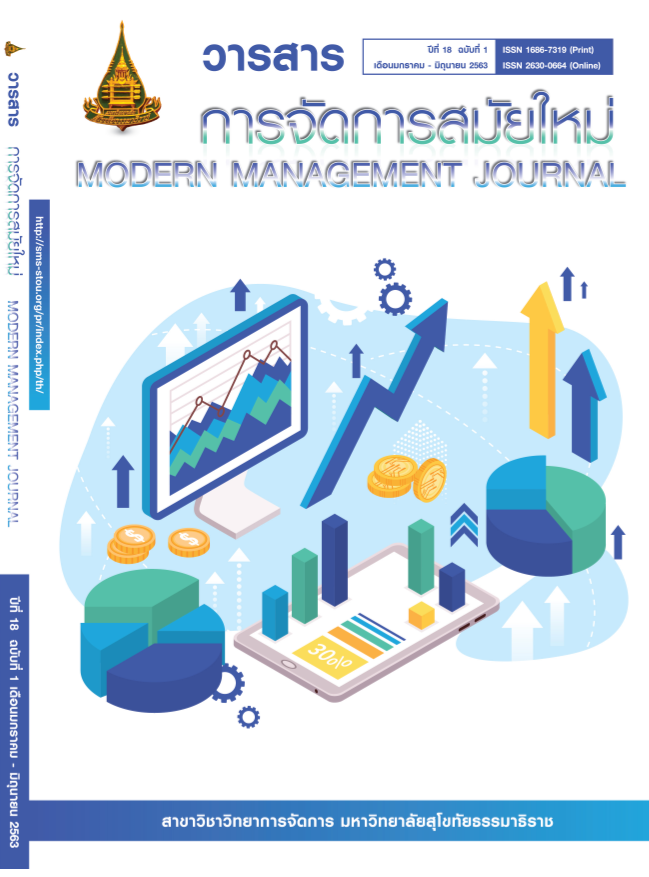FACTORS THAT INFLUENCE THE FINANCIAL DISCIPLINE OF OFFICERS OF ROYAL THAI ARMED FORCES HEADQUARTERS
Keywords:
Financial discipline, Financial literacyAbstract
The research aims to study the financial discipline of the officers at the Royal Thai Armed Forces Headquarters, to investigate their financial knowledge, and to discover factors with regard to behavior, attitude, and financial knowledge affecting their financial discipline. The samples were 355 participants. The instrument for data collection was a 5-likert scale questionnaire. Path analysis and regression analysis were employed for data analysis. The results showed that the financial discipline of the officers was at a high level. Mean 49% of the samples had never defaulted on their loans. In general, they were found to have had financial plans with their spending objectives. However, they were found not to keep records of their incomes and expenses regularly. Additionally, their financial knowledge was at a moderate level (3.23). Most of them lacked understanding of purchasing power and time value of money. Finally, their attitude, media exposure, social norm, and consumerism affected their financial discipline. More interestingly, attitude was the most significant factor. Financial literacy was not found to have an effect on their financial discipline.
References
Allport, G. W. (1975). Attitude and Psychology. San Francisco: Jossey Bass.
Atkin, C. K. (1973). Anticipated Communication and Mass Media Information Seeking. New York: Free Press.
Bandura, A. (1997). Self-efficacy: The exercise of control. New York: W.H. Freeman.
Bank of Thailand. (2013). Household Financial Inclusion Survey 2013. Bangkok: Bank of Thailand. [In Thai]
Bank of Thailand. (2016). Household Financial Inclusion Survey 2016. Bangkok: Bank of Thailand. [In Thai]
Bank of Thailand. (2019). Credit Card Data Classified by Types of Cards. Retrieved form https://www.bot.or.th/App/BTWS_STAT/statistics/BOTWEBSTAT.aspx?reportID=757&language=ENG [In Thai]
Boonklee, B. (2009). Factors Affecting Financial Discipline Behavior among Teachers: A Case Study of Teachers in Nakonpathom Education Region, Area 2. (Master’s thesis). National Institute of Development Administration, Bangkok. [In Thai]
Bordeerat, W. (2010). Financial Discipline. Retrieved form http://www.set.or.th/dat/vdoArticle/attachFile/TSI-Article_PF_040.pdf [In Thai]
Chuensuk, C. (2017). Debt Recovery Clinic: The complete solution for personal debt. Retrieved form https://www.bot.or.th/Thai/ResearchAndPublications/DocLib_/Article12_01_60.pdf [In Thai]
Directorate of Joint Personnel of Royal Thai Armed Forces Headquarters. (2018). RTARF personnel status account on September 30, 2018. Bangkok: Directorate of Joint Personnel.
Kenan Foundation Asia. (2015). Literacy Improvement for better Finance in Thailand. Retrieved form https://thaipublica.org/wp-content/uploads/2015/03/1.Citi-LIFT-FL-Research-Report-THAI_Draft.pdf [In Thai]
Lusardi, A. (2008). Financial Literacy: an essential tool for informed consumer choice. Retrieved from https://www.nber.org/papers/w14084
Namphud, S., Viwattana, S., & Jeroenjittakam, A. (2014). Personal financial management strategies (6th ed.). Bangkok: Thammasat University. [In Thai]
National Statistical Office. (2017). Household Income and expenditure. Retrieved form http://www.nso.go.th/sites/2014 [In Thai]
Navavongsathian, A. (2019). The factors affecting brand awareness of private higher education institutions in the context of social media of vocational education level students in Samutprakarn province. Modern Management Journal, 17(1), 147-161.
Newcomb, T. M. (2009). Attitude. Retrieved from http://www.novabizz.Ace/Attitude.htm
Panthongkhum, N. (2016). Factors Related to the Behavior of Financial Discipline of Undergraduate Students, Kasetsart University, Kamphaeng Sean Campus (Master’ thesis). Kasetsart University, Bangkok. [In Thai]
Pongpaitoon, D. (2001). Information exposure, Knowledge and Attitude toward Sex Education of teenagers in Bangkok (Master’ thesis). Chulalongkorn University, Bangkok. [In Thai]
Roger, D. (1978). The psychology of adolescence. New York: Appleton Century-Crofts.
Royal Thai Armed Forces Headquarters Savings and Credit Cooperative, Limited. (2019). Summary of cooperative financial information. Retrieved form http://rtarffsccoop.com/main/moneyservice/coopstatus/ [In Thai]
Ruanson, P. (2018). Analysis of Debt on Royal Thai Armed Forces Headquarters Savings and Credit Cooperative Limited of Noncommissioned Officers (Master’ thesis). Rangsit University, Pathum Thani. [In Thai]
Sariwat, L. (2001). Psychology in daily life. Bangkok: Odian Store. [In Thai]
Sukglun, A. (2019). Corporate communications strategy to create a strong organizational culture. Modern Management Journal, 16(1), 75-82.
Sukornphak, S., & Sirisukkhajorn, S. (2010). How to manage money to become super rich. Samut Prakan: My Best Book. [In Thai]
Suwanik, S. (2018). Where should the sustainable solution for Thai household debt problems begin?. Retrieved form https://www.bot.or.th/Thai/ResearchAndPublications/articles/Pages/Article_2Oct2018.aspx [In Thai]
Tejapira, K., & Eawsriwong, N. (1997). The viewpoint of two thinkers Nithi – Kasian Thai culture in the IMF era. Nationweekend, 6(275), 21-23. [In Thai]
Triandis, H. C. (1971). Attitude and Change. New York: Wiley.
Wankaew, S. (1997). The changes of Thai society and future trends: The problems of Thai society in the era of consumption and conflicts in resource allocation. Bangkok: Global Competence Project. [In Thai]
Yamane, T. (1973). Statistics: An Introductory Analysis (3rd ed.). New York: Harper and Row Publication.
Yathaputanon, W. (2017). Financial discipline, can it really be created?. Retrieved form https://www.bot.or.th/Thai/ResearchAndPublications/DocLib_/Article_12Apr2017.pdf [In Thai]
Yeelansuwan, S. (2015). Media exposure, Knowledge, Attitude and Behavior toward the Social Development Projects of Youth Leaders of Asean Countries and Japan via Facebook (Master’ thesis). Thammasat University, Bangkok. [In Thai]



